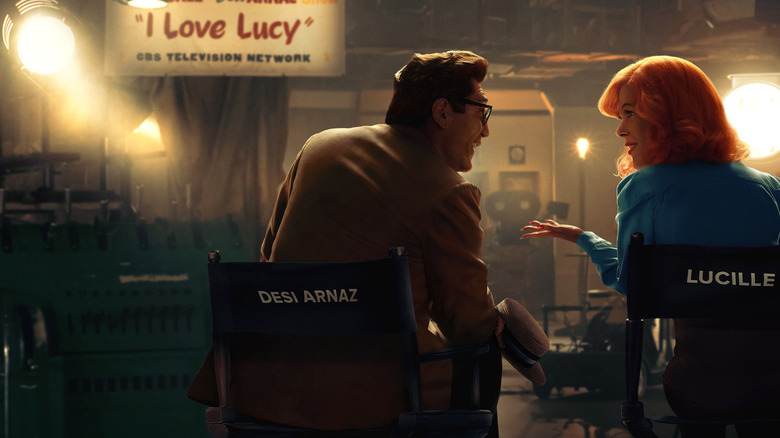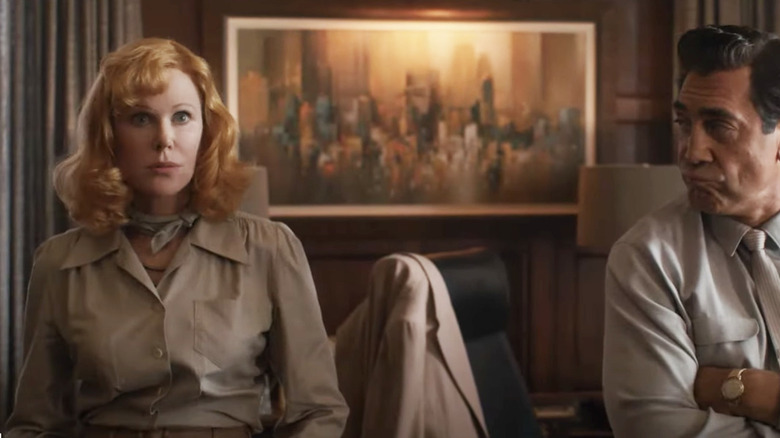Being The Ricardos Review: An Exhausting And Unfunny Look At One Of The Funniest People Ever
Some multi-hyphenate filmmakers become their own worst enemy because they end up being stronger directors than writers, or vice versa. And then some multi-hyphenate filmmakers shouldn't attempt to broaden their scope at all. To wit, Aaron Sorkin, who proved himself earlier in his career to be extremely gifted at capturing the rat-a-tat, rapid-fire pace of the world of media and politics, grafting urgency while depicting people speed-walking and talking through the halls of Washington, D.C. and New York. But Sorkin's best script remains his Oscar-winning "The Social Network," a film aided as much by the gifted hand of David Fincher as director. Sorkin, in his last few scripts, has directed his own work. And nowhere is it clearer than in his latest, "Being the Ricardos," that he should let someone else step behind the camera. "Being the Ricardos" is a good idea in search of focus, intelligence, wit, and a skilled directorial hand.
The ingredients are there for a quintessential Sorkin script in "Being the Ricardos". Set over a tight period of time? Check — the story takes place over one work week. Connected to politics? Check — the specter of the Red Scare hovers over the film, as none other than Lucille Ball (Nicole Kidman) is accused of being — gasp! — a Communist. Connected to the inner workings of the medium of television? Check — the film is primarily set at Desilu Studios as Lucille and her husband Desi Arnaz (Javier Bardem) work on the massively popular "I Love Lucy." Full of overly verbose people who are not-so-secretly convinced they're all the smartest person in the room? Double check. But in spite of setting his story amidst the making of one of the most famous television shows of all time, and featuring two of its stars as his leads, Sorkin is unable to actually craft a story that's compelling, entertaining, or even remotely witty. (His interview last month with an industry trade in which he said he thought "I Love Lucy" wasn't that funny is reflected in a film that has no concept of humor itself.)
Part of the problem is that the impact of the Red Scare on Hollywood is the infamous and terrible blacklisting of actors, writers, and filmmakers who the U.S. government had decided were Communists or Communist sympathizers. And seeing as "I Love Lucy" is one of the most wildly popular television shows ever made, still well-known and widely loved in the 2020s as it was in the 1950s...well, you don't recall Lucille Ball being blacklisted because it never happened, thus making most of the tension over whether or not she'll be smeared in the news pretty much moot. Leave aside the accidentally grim way in which this film treats being exonerated by an intensely, immaturely conservative government of the period as a badge of honor.
A Film About Comedy That Refuses to be Funny
The other part of the problem is that "Being the Ricardos" is almost stridently unwilling to be funny. Outside of Kidman and Bardem, the cast has some pretty talented folks who are plenty adept at comedy: J.K. Simmons and Nina Arianda play William Frawley and Vivian Vance, the actors who played Fred and Ethel on "I Love Lucy", and Jake Lacy, Tony Hale, and Alia Shawkat play the writers of the show. (It is a real shame that, at no point in this film, Shawkat never looks around and shouts, "Marry me!", a la Maeby Funke from "Arrested Development" back in her days as a teenage Hollywood executive.) But considering that Aaron Sorkin is, among his many other credits, the creator of the by-turns arrogant and overwrought "Studio 60 on the Sunset Strip," it is perhaps no surprise that "Being the Ricardos" is a hectoring affair whose depiction of the crafting of even the simplest sight gag is exhausting. If, indeed, this is how the sausage was made, then looking behind the scenes is the worst possible idea.
The cast does as well as they can with such plodding material and stiff direction. Well, at least the supporting actors. (Simmons, in particular, is extremely well-cast as Frawley — he not only looks pretty much like a dead ringer for the actor, but he aces the grouchy exterior in every line reading.) Much was made early on about how Nicole Kidman is not exactly Lucille Ball's identical twin. It's not so much an issue that Kidman won't be mistaken for Lucy — the same can be said of Bardem not looking like Arnaz, but he does a fairly solid job embodying the boisterous and shrewd performer. It's that Kidman's performance feels as rigid as Sorkin's depiction of one of the most brilliant comic performers of her generation. It's deliberate that we rarely see Kidman as Lucy Ricardo, as opposed to Lucille Ball, in that the script is about the making of the show without ever really being about "I Love Lucy." But that Lucy seems a lot more interesting than the one we're presented with throughout "Being the Ricardos".
Maybe at an earlier time in Aaron Sorkin's career, "Being the Ricardos" could've worked. At the very least, his directorial efforts make clear that he's not nearly as well-served as writer when he's behind the camera too. What would "The Social Network" have looked like if he directed it instead of Fincher? Would the film be held up as a searing satire on the level of Lumet's "Network"? Or would it have been forgotten quickly? "Being the Ricardos," with the script it has, would not have been a great film had a better director made it. But a better director would have improved its flaws, or maybe pushed Sorkin to go through some of the elements and refashion them. "Being the Ricardos" needed a different voice; the one here profoundly, obstinately refuses to grasp the inner workings of the comic mind.
/Film Rating: 3 out of 10

